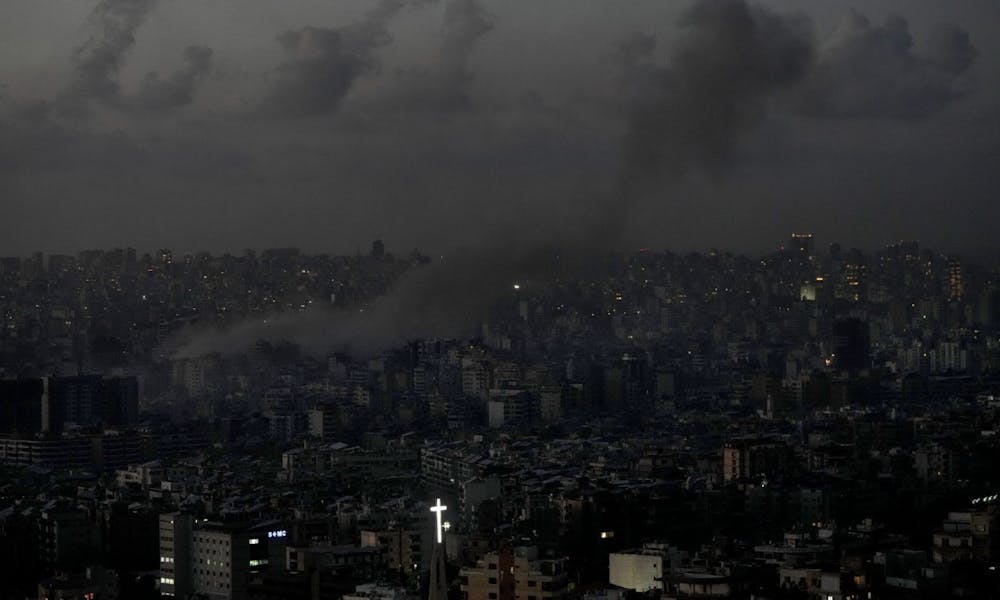On the streets of Lebanon, videos show plumes of smoke rising from the piles of gray rubble where buildings used to stand.
Over the past month, Israel’s war with Hezbollah in Lebanon has erased villages from the map and displaced an estimated 1.2 million people.
Israeli Prime Minister Benjamin Netanyahu has stated that the purpose of the incursion into Lebanon is to eliminate Hezbollah, the Iran-backed paramilitary group that has been attacking Israel since Oct. 8, 2023.
The Goal
Hezbollah has a long history of conflict with Israel; the group was formed in response to Israel’s 18-year occupation of southern Lebanon.
Because of this, anti-Zionism and antisemitism are defining characteristics of Hezbollah.
“It would be virtually impossible [to eliminate Hezbollah] because as long as there is what is perceived to be some kind of oppression by [Israel], there will always be some kind of resistance to it,” said Shirvin Zeinalzadeh, a graduate teaching associate at ASU with expertise in Middle Eastern diplomacy.
Though the nation celebrated the assassination of longtime Hezbollah leader Hassan Nasrallah in September, Arizonan experts suggest that killing its members does little to dismantle the group.
“Hezbollah is more than just a group of fighters,” Zeinalzadeh said. “It's more than just a resistance movement. It's an ideology.”
However, Israel remains determined to accomplish this mission through a particularly destructive type of war.
The Strategy
Israel first used the Dahiyeh doctrine, named after the suburb of Beirut that functions as Hezbollah’s headquarters, in the 2006 Lebanon War.
“This Israeli doctrine is summarized by ‘if you throw a rock at me, I will come at you with a tank and wipe you out,’” said Mirna Lattouf, a professor of Middle East studies at ASU.
Proponents of the doctrine say it will cause civilians to tire of the war and turn against Hezbollah. So far, this hasn’t worked in practice.
Not only did Hezbollah’s popularity rise after the 2006 war, but many analysts considered it a loss for Israel as it failed to dismantle the group.
Even if the civilians in Dahiyeh reject Hezbollah, “all it will do is push them to other places,” Zeinalzadeh said.
Regardless of whether or not it’s effective, the doctrine is widely unpopular.
The United Nations has accused the Israeli government of committing war crimes such as mass displacement, destruction of civilian property and wilful killing.
These actions have sparked protests around the world, many of them on college campuses.
“If their goal is truly getting the hostages back or solving terrorism or whatever they say it is, then they wouldn't be bombing civilian areas,” said Hayden Nguyen, co-chair of the ASU Students for Justice in Palestine. “They wouldn't be doing the things that they're doing.”
The mass destruction and high death tolls has the international community pushing for an end to the war.
The Solution
However, the involvement of global powers like Iran and the US in the matter makes the path to peace more difficult.
“[Groups like Hezbollah] are heavily intertwined with other states in the region, who in turn are clients of bigger states… As long as the funding keeps coming in, and other global powers have a stake in the region, there will be conflict,” Lattouf said.
Since Iran funds Hezbollah and Hamas, its participation in peace talks is vital. Compromises between every party’s needs must be made to reach a solution, according to Zeinalzadeh.
“Iran… wants to see peace in Gaza, in Lebanon, and it wants to see an end to foreign interference in the region. That's going to be very difficult to achieve,” Zeinalzadeh said.
Israel’s expansionist goals further obstruct the pursuit of a peaceful solution.
Part of Netanyahu’s right-wing coalition supports the realization of Greater Israel, the historic (or desired) borders of the country.
Though definitions of Greater Israel vary, the broadest includes all of Lebanon and Jordan, as well as parts of Egypt, Syria, Iraq and Saudi Arabia.
“Netanyahu has aligned himself with the Israeli extreme far right-wing in order to stay in power… Conflict, war, and invasions are part of their strategy to occupy more land,” Lattouf said.
The nation has a history of controversial occupations. These include the Golan Heights in Syria from 1967-present and southern Lebanon from 1982-2000, as well as the Palestinian territories.
A now-deleted article from The Jerusalem Post titled, “Is Lebanon part of Israel’s promised territory?” caused many to doubt Israel’s intentions with the war.
“Israel itself is an apartheid regime, which is built on the idea of expanding settlements… and I believe the invasion of Lebanon is just an extension of that,” Nguyen said.
Given the history and current trends, few people have faith that peace can be achieved.
“The more things… change, the more they seem to stay the same,” Lattouf said. “At the end of the day, I am very concerned about [the] children, all children, who have been raised to fear, hate, and kill.”

